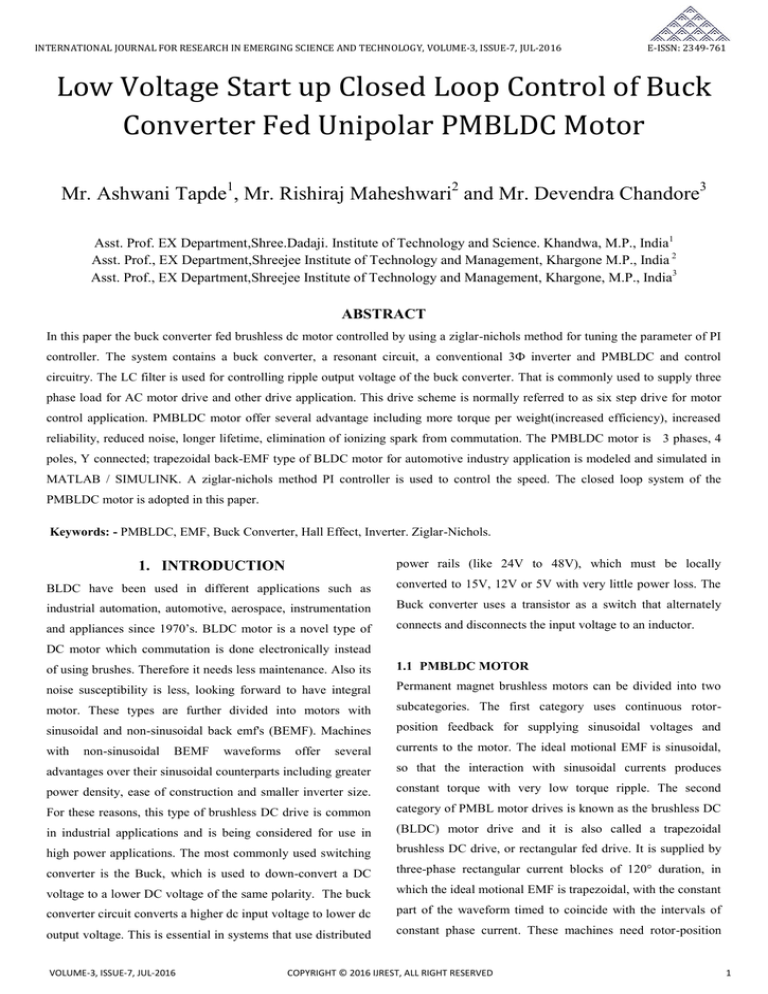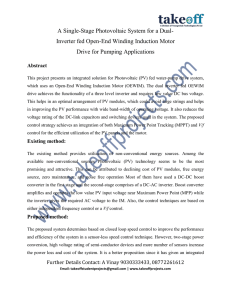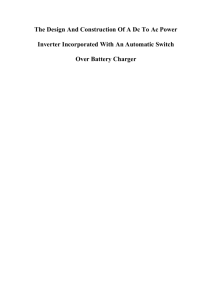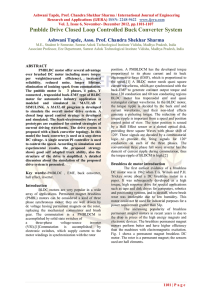
INTERNATIONAL JOURNAL FOR RESEARCH IN EMERGING SCIENCE AND TECHNOLOGY, VOLUME-3, ISSUE-7, JUL-2016
E-ISSN: 2349-761
Low Voltage Start up Closed Loop Control of Buck
Converter Fed Unipolar PMBLDC Motor
Mr. Ashwani Tapde1, Mr. Rishiraj Maheshwari2 and Mr. Devendra Chandore3
Asst. Prof. EX Department,Shree.Dadaji. Institute of Technology and Science. Khandwa, M.P., India1
Asst. Prof., EX Department,Shreejee Institute of Technology and Management, Khargone M.P., India 2
Asst. Prof., EX Department,Shreejee Institute of Technology and Management, Khargone, M.P., India3
ABSTRACT
In this paper the buck converter fed brushless dc motor controlled by using a ziglar-nichols method for tuning the parameter of PI
controller. The system contains a buck converter, a resonant circuit, a conventional 3Ф inverter and PMBLDC and control
circuitry. The LC filter is used for controlling ripple output voltage of the buck converter. That is commonly used to supply three
phase load for AC motor drive and other drive application. This drive scheme is normally referred to as six step drive for motor
control application. PMBLDC motor offer several advantage including more torque per weight(increased efficiency), increased
reliability, reduced noise, longer lifetime, elimination of ionizing spark from commutation. The PMBLDC motor is 3 phases, 4
poles, Y connected; trapezoidal back-EMF type of BLDC motor for automotive industry application is modeled and simulated in
MATLAB / SIMULINK. A ziglar-nichols method PI controller is used to control the speed. The closed loop system of the
PMBLDC motor is adopted in this paper.
Keywords: - PMBLDC, EMF, Buck Converter, Hall Effect, Inverter. Ziglar-Nichols.
1. INTRODUCTION
power rails (like 24V to 48V), which must be locally
BLDC have been used in different applications such as
converted to 15V, 12V or 5V with very little power loss. The
industrial automation, automotive, aerospace, instrumentation
Buck converter uses a transistor as a switch that alternately
and appliances since 1970’s. BLDC motor is a novel type of
connects and disconnects the input voltage to an inductor.
DC motor which commutation is done electronically instead
of using brushes. Therefore it needs less maintenance. Also its
1.1 PMBLDC MOTOR
noise susceptibility is less, looking forward to have integral
Permanent magnet brushless motors can be divided into two
motor. These types are further divided into motors with
subcategories. The first category uses continuous rotor-
sinusoidal and non-sinusoidal back emf's (BEMF). Machines
position feedback for supplying sinusoidal voltages and
with
several
currents to the motor. The ideal motional EMF is sinusoidal,
advantages over their sinusoidal counterparts including greater
so that the interaction with sinusoidal currents produces
power density, ease of construction and smaller inverter size.
constant torque with very low torque ripple. The second
For these reasons, this type of brushless DC drive is common
category of PMBL motor drives is known as the brushless DC
in industrial applications and is being considered for use in
(BLDC) motor drive and it is also called a trapezoidal
high power applications. The most commonly used switching
brushless DC drive, or rectangular fed drive. It is supplied by
converter is the Buck, which is used to down-convert a DC
three-phase rectangular current blocks of 120° duration, in
voltage to a lower DC voltage of the same polarity. The buck
which the ideal motional EMF is trapezoidal, with the constant
converter circuit converts a higher dc input voltage to lower dc
part of the waveform timed to coincide with the intervals of
output voltage. This is essential in systems that use distributed
constant phase current. These machines need rotor-position
non-sinusoidal
BEMF
VOLUME-3, ISSUE-7, JUL-2016
waveforms
offer
COPYRIGHT © 2016 IJREST, ALL RIGHT RESERVED
1
INTERNATIONAL JOURNAL FOR RESEARCH IN EMERGING SCIENCE AND TECHNOLOGY, VOLUME-3, ISSUE-7, JUL-2016
E-ISSN: 2349-761
information only at the commutation points, e.g., every
-----eq (6)
60°electrical in three-phase motors. The PMBLDC motor has
its losses mainly in the stator due to its construction; hence the
The induced emfs can be written as
heat can easily be dissipated into the atmosphere. As the back
EMF is directly proportional to the motor speed and the
developed torque is almost directly proportional to the phase
current, the torque can be maintained constant by a stable
-----------------------eq (7)
stator current in a PMBLDC motor.
The coupled circuit equations of the stator windings in terms
These values from (6) can be substituted in (5) to obtain the
of motor electrical constants are
value of torque
------------------------eq(8)
Electrical rotor speed and position are related by
------eq (1)
d θ/dt = (P/2)* ω
------------------------eq (9)
Combining all the equations, the system space form becomes
-----eq (2)
X’ = Ax + Bu
----------------------eq(10)
∑ BEMFs means summing up the individual phase emfs on an
instant to instant basis. The induced emfs are all assumed to be
------------eq (11)
trapezoidal, whose peak value is given by:
Thus the state space matrix becomes:
Ep= (BLv) N = N (Blr ω) = NΦ ω= λ ω. -------------eq (3)
Φ represents flux linkage=BLr
If there is no change in rotor reluctance with angle because of
no salient rotor and assuming three symmetric phases,
inductances and mutual inductances are assumed to be
symmetric for all phases, i.e. (1) becomes:
-------eq (12)
-----eq (4)
Simplifying (3) further we get equation (4)
---------eq (13)
---------------eq (14)
All the equations form the entire state space model for the
---eq (5)
BLDC. Consistent system of units must be used.
The generated electromagnetic torque is given by
VOLUME-3, ISSUE-7, JUL-2016
COPYRIGHT © 2016 IJREST, ALL RIGHT RESERVED
2
INTERNATIONAL JOURNAL FOR RESEARCH IN EMERGING SCIENCE AND TECHNOLOGY, VOLUME-3, ISSUE-7, JUL-2016
1.2 BUCK CONVERTER
A step down (BUCK) converter produces a lower average
I I
Edc Eo L 2 1 …………………(1)
Ton
output voltage Eo then the d.c. input voltage E dc. By varying
the Duty-ratio Ton
/ T of the transistor, the average output
E-ISSN: 2349-761
Let us define, duty ratio=
Ton
.
T
voltage can be controlled. The associated voltage and current
waveform for the continuous current flow in the inductor.
Eo .Edc ……………………………….(2)
Transistor T1 is switch on at time t=0. The supplies current
which rise, flow through the path filter inductor, filter
Now the capacitor voltage is expressed as
capacitor and load resistance. Therefore, the inductor stored
energy
during
Ton
the
period.
Vc
1
ic dt Vc (t 0)
C
1.3 ZIEGLER–NICHOLS METHOD
The method is based on characterization of process dynamics
by a few parameter and simple equation for the controller
parameter. One tuning method presented by Ziegler and
Nichols is based on process information in the form of the
closed loop step response. This method can be viewed as a
traditional method based on modeling and control where a
very simple process model is used. The step response is
characterized by only two parameters T and L, as shown in:Fig: -1.1 BUCK Converter
In general, the voltage across the inductor L is given by
eL L
di
dt
Control
Type
Fig: -1.2 Characterization of a step response in the Ziegler
Nichols step response method.
P
-
-
The point where the slope of the step response has its
maximum is first determined, and the tangent at this point is
PI
-
drawn. The intersections between the tangent and the
coordinate axes give the parameters T and L. The controller
parameters are then obtained from Table1. An estimate
PID
of the period Tp of the closed loop system is also given in the
In time Ton , assuming that the inductor current rises linearly
form I1toI 2 ,
VOLUME-3, ISSUE-7, JUL-2016
table.
2. MATLAB SINULATION AND RESULT
COPYRIGHT © 2016 IJREST, ALL RIGHT RESERVED
3
INTERNATIONAL JOURNAL FOR RESEARCH IN EMERGING SCIENCE AND TECHNOLOGY, VOLUME-3, ISSUE-7, JUL-2016
E-ISSN: 2349-761
Closed loop system is simulated using MATLAB Simulink.
The Simulink model buck converter fed brushless dc motor
Ha
Hb
Hc
Ha’
Hb’
Hc’
drive which shown in Fig.1.3. Here 48V DC is stepped down
Ha*
Hb*
Hc*
Hc’
Hc’
Ha’
to 24V DC using a buck converter. The output of buck
0
0
0
1
1
1
0
0
0
converter is filtered using pi-filter. The output of the pi-filter is
0
0
1
1
1
0
0
0
1
applied to the three phase inverter, the inverter produces three
0
1
0
1
0
1
0
1
0
phase voltage required by the PMBLDC motor.
0
1
1
1
0
0
0
0
1
The comparator circuit is used to controls the pulse width
1
0
0
0
1
1
1
0
0
applied signal for conducting the buck MOSFET. In this
1
0
1
0
1
0
1
0
0
circuit the two signals are enter. One signal are come for the pi
1
1
0
0
0
1
0
1
0
controller and other signal are come for the repeating signal,
1
1
1
0
0
0
0
0
0
both the signals are to difference and the signal are gave to the
A decoder is a circuit that changes a code into a set of signals.
relay. The relay is used as a sensing device and the relay is
It is called a decoder because it does the reverse of encoding,
sense the signal. If the signal is zero the relay is off and if the
but we will begin our study of encoders and decoders with
signal is one the relay is on the MOSFET is conduct.
decoders because they are simpler to design. A common type
of decoder is the line decoder which takes an n-digit binary
Ha’*
Hb’*
Hc’*
Emf
Emf
Emf
number and decodes it into 2n data lines. The simplest is the
Hb
Hc
Ha
a
b
c
1-to-2 line decoder. The truth table is A is the address and D is
0
0
0
0
0
0
the data line. The gate circuit is used to triggering gate pulse
0
1
0
0
-1
+1
for commutation in to the inverter. The above truth table
1
0
0
-1
+1
0
shown the EMFs signal are enter in the gate circuit and the
1
0
0
-1
0
+1
0
0
1
+1
0
-1
0
1
0
+1
-1
0
0
0
1
0
+1
-1
0
0
0
0
0
0
signal are compared to the grater then to zero or less then to
zero. This signal is throwing to the inverter and inverter is
conducting. If the signal is zero the inverter is not conducting
Gates
powergui
Gates emf_abc
Decoder
emf_abc
g
D
2.1 SIMULATION RESULT
Vabc
The result is show the drive system with the buck converter
Iabc
topology that is reduced the switching losses. The system is
Hall
+ v
-
Discrete,
Ts = 5e-005 s.
and if the signal is one the inverter is conducting.
work at low voltage that the power losses are low. The
S
Scope6
switching are through into the inverter at 120 degree mode and
g
D
g
the output voltage of the inverter is displayed by 120 degree
Iabc
<Stator back EMF e_a (V)>
S
S
S
g
D
D
Vabc
A Vabc
Iabc
B
a
b
C
c
+v
-
each other. Same the output current of the inverter is very 0.5
Tm
<Stator back EMF e_b (V)>
A
m
<Stator back EMF e_cV)>
B
to -0.5. The output of the rotor speed is 1360 rpm or
C
<Rotor speed wm (rad/s)>
<Electromagnetic torque Te (N*m)>
-KGain
160red/sec. the electromagnetic torque is 1 N-m.
g
D
S
g
D
S
g
S
D
RMS RMS
PI
130
Out1
In1
Fig: -1.3 MATLAB model for buck converter for PMBLDC
motor.
VOLUME-3, ISSUE-7, JUL-2016
COPYRIGHT © 2016 IJREST, ALL RIGHT RESERVED
4
INTERNATIONAL JOURNAL FOR RESEARCH IN EMERGING SCIENCE AND TECHNOLOGY, VOLUME-3, ISSUE-7, JUL-2016
Fig1.4:-The triggering pulse.
E-ISSN: 2349-761
Fig:-1.9:-Electromagnetic torque waveform.
Fig:-1.10:-Rotor speed waveform.
Fig1.5:-phase voltage of inverter.
Fig1.11:-output of the buck converter
The calculated gains of pi controller is Kp=9,Ki=0.04.and the
PMBLDC motor parameter.
Fig1.6:-output current of inverter.
3. CONCLUSION
In this paper presented the simulation model of the BLDC
motor drive system with ziglar-nichols method for tuning the
parameter of PI controller based speed control and four switch
three phase inverter on MATLAB/Simulink platform is
Fig1.7:-input DC voltage.
presented .modeling. Simulation and analysis of a low voltage
Closed Loop Controlled Buck Converter Fed Pmbldc Drive
System. The torque control algorithm is based on a variable
structure strategy and the switching patterns for the inverter
are generated directly by the digital controller. The maximum
torque load of 1.2 N-m, the torque feedback information is
derived from knowledge of machine parameters, instantaneous
currents and the rotor angle. Buck converter is reduce the
Fig:-1.8:-Back EMF waveform
input voltage to the required value. Pi-filter is reduce the
ripple. The speed range between the 0 to 2500 rpm according
VOLUME-3, ISSUE-7, JUL-2016
COPYRIGHT © 2016 IJREST, ALL RIGHT RESERVED
5
INTERNATIONAL JOURNAL FOR RESEARCH IN EMERGING SCIENCE AND TECHNOLOGY, VOLUME-3, ISSUE-7, JUL-2016
E-ISSN: 2349-761
to our application requirement. The stator current and the
[9] S. Prakash and R. Dhanasekaran” Modelling and
motor back EMFs are discussed under rated condition. All
Simulation of Closed Loop Controlled Buck Converter
switches work under soft-switching condition, so their power
Fed Pmbldc Drive System” April 20, 2011
losses are small. Experimental results derived from BLDCM
[10] A J forsyth and S V mollov “modelling and control of
drives without using any current and Hall sensors fully
DC-DC converters ” power engineering journal oct1998.
confirm the theoretical analysis.
[11] Shelgaonkar (Bindu) Arti Kamalakar, N. R. Kulkarni
“Performance verification of dc-dc buck converter using
sliding mode controller for comparison with the existing
ACKNOWLEDGEMENT
The authors gratefully acknowledge the Electrical and
controllers – a theoretical approach” ijaet jan 2012
Electronics Engineering department, Shree.Dadaji. Institute of
[12] A.Kalirasu and S.S.Dash “Modeling and Simulation of
technology and Science. Khandwa, Madhya Pradesh, India for
Closed Loop Controlled Buck Converter for Solar
their continued support, encouragement and the facilities
Installati” Vol. 3, No. 2, April, 2011
provided to carry out this research work. The authors would
[13] Abdelali El Aroudi, Bruno Gérard Michel Robert, Angel
Cid-Pastor, Luis Martínez-Salamero “Modeling and
like to thank my entire relative, friends and my father.
Design Rules of a Two-Cell Buck Converter Under a
Digital PWM Controller” vol. 23, no. 2, march 2008
REFERENCE
[14] J.Karthikeyan, Dr.R.Dhanasekaran “simulation and
[1] C.T. Lin, C.W Hung, and C.W Liu,” position sensorless
control
method
for
motor”drives”,IEEE
four
switch
transaction
brushless
Power
DC
Electron,
vol.23, no1, pp438-444, Jan.2008
implementation of currentcontrol of bldc motor based on
a common dc signal” vol. 2(6), 2010, 1632-1639
[15] Padmaraja Yedamale “Brushless DC Motor Control
Using
[2] Bhim Singh and Sanjeev SinghState of the Art on
PIC18FXX31
MCUs”
2004
Microchip
Technology Inc.
Permanent Magnet Brushless DC Motor Drives. October
9, 2008
[3] R.Krishnan “Electric Motor Drives modeling, analysis,
and control” prentice-hall of India pvt ltd.,2005
[4] M. D. Sing “power electronics” Khanna Publishers, New
Delhi, 2003. 3rd Edition.
[5] G. K. Dubey, “Power Semiconductor Controlled
Drives”, Prentice Hall, New Jersey, 1989
[6] Qiang Han, Nikolay Samoylenko” Average-Value
Modeling of Brushless DC Motors With 120◦ Voltage
Source Inverter” vol. 23, no. 2, june 2008
[7] Sanjeev Singh , Bhim Singh “A Voltage-Controlled PFC
Cuk Converter-Based PMBLDCM Drive for AirConditioners”
IEEE
transactions
on
industry
applications, vol. 48, no. 2, march/april 2012
[8] Zhi Yang Pan and Fang Lin Luo “Novel Soft-Switching
Inverter for Brushless DC Motor Variable Speed Drive
System”. IEEE transactions on power electronics, vol.
19, no. 2, march 2004
VOLUME-3, ISSUE-7, JUL-2016
COPYRIGHT © 2016 IJREST, ALL RIGHT RESERVED
6



